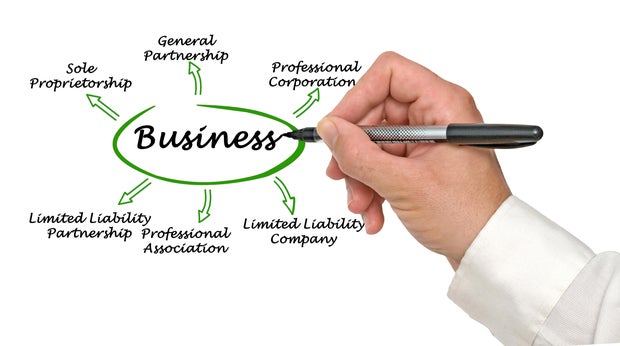LLC vs sole proprietorship: How to choose which is right for your business
When you're starting a small business on your own, choosing a setup - or business structure - can seem daunting. As a business owner, you'll most likely first choose whether to run your business as a sole proprietorship or an LLC (limited liability company). Your decision will have consequences not just for your business, but also for your personal finances, taxes and liability.
If you're a prospective small business owner, you might not know where to begin with a business structure. An online small business lending company can help you navigate the process - plus, you can apply for a loan within minutes.
If you're looking for more guidance on how to set up your small business, here's an easy guide.
How to choose which is right for you
Much of your choice may depend on your business type. As always, it's a good idea to consult with a lawyer, business counselor, accountant or professional organization in your field.
Consider your long-term ambitions for the business. Do you plan to add employees and managers, or will it just be you running things over the long term?
If you don't anticipate expanding the business or adding partners, then sole proprietorship may be for you.
LLCs can be a good choice if your business comes with legal or financial risks, or if you want liability protection for your personal assets. Research what's required under your state's rules through your secretary of state's office. Another good source of information is the U.S. Small Business Administration.
Before you make any final decisions, make sure you do some thorough research. It's important to fully understand the difference between an LLC and a sole proprietorship - and what each option has to offer. Let's start with an LLC.
What is an LLC?
An LLC does just what it sounds like: it limits personal liability for business owners. It also splits business from your personal activities.
Many people who create a business form an LLC to shield personal assets like vehicles, homes and savings from legal or financial trouble, such as bankruptcy or business debt collectors.
LLCs are governed by the states, mostly through the secretary of state's office. You will likely incur an initial filing fee. Fees vary widely from state to state - with most between $50 and $150. Some are higher. Many states also require an ongoing compliance fee and/or an annual report or update. You'll want to thoroughly research your state's requirements.
LLCs can be owned by many people, companies, other LLCs or even foreign entities. Most states don't limit the number of LLC owners. Many states also allow single-member LLCs.
If you're in need of a small business loan, you have options to consider.
What is a sole proprietorship?
A sole proprietorship means you're working for yourself alone. You're in charge and are responsible for the business entity.
It's the easiest business type to form with the lowest startup costs. Independent contractors, business owners and even franchisees can all be sole proprietors. In fact, if you earn revenue from a solo business, you may not realize the IRS considers that work a sole proprietorship by default.
As a sole proprietor, you are personally responsible for any and all decisions or risks, including legal compliance, permits, accounts, taxes, debts and contracts.
That's perhaps the biggest difference between a sole proprietorship and an LLC. Unlike a sole proprietorship, an LLC can help you avoid personal legal, tax and debt trouble if you are sued or a debt collector comes after unpaid bills for the business.
Under a sole proprietorship, your business name is automatically the same as your personal name. You can also register a fictitious, or trade, name to distinguish your business from your personal activities. That's known as a DBA, short for "Doing Business As."
What about taxes?
You don't have to file a separate tax return from your personal return as a sole proprietor. Technically, a sole proprietorship falls under IRS "pass-through" tax rules. That means business operations, including earnings, pass through to your personal tax return.
LLCs have more options. You'll want to consider them carefully. There are many kinds of LLCs and the IRS treats some of them differently. For example, the IRS automatically treats LLCs using the same "pass-through" rules as a sole proprietorship. The LLC doesn't pay taxes on business income. Rather the members - or owners - pay taxes on their share of the LLC's business profits.
But LLC owners can also ask to be taxed as a corporation. That may have certain advantages for some kinds of business owners, like the type of retirement savings vehicle you may want to use.
Check with an accountant, lawyer or financial advisor to see what structure might be right for you and your goals.
Some other factors to consider
Here are some factors to think about before you pick an LLC or sole proprietorship:
Sole proprietorship
- It's the easiest and least pricey way to start and run a solo business
- You make all the decisions - and bear all the risk
- You don't have to register your business separately
- You only need to file a personal tax return with the IRS
- You can't file taxes as a corporation and may miss advantages
- You and your personal assets aren't shielded from lawsuits or other risks, like debt collectors if the business hits financial trouble
LLC
- With an LLC, you can easily add another owner to expand
- Your personal assets can be shielded from financial and legal liability
- There may be tax benefits versus a sole proprietorship
- No need to register a fictitious name - LLCs must have their own
- There's more paperwork, fees and other potential ongoing costs to stay in compliance versus a sole proprietorship
- If you want to add owners or members, you'll no longer be the only decision-maker
- An LLC requires its own tax identification number (TIN) and bank account
Can you convert a sole proprietorship to an LLC?
Simply put: yes. You may want to consider converting if you're concerned about legal exposure, or if you want to grow your business beyond a single owner or partnership.




